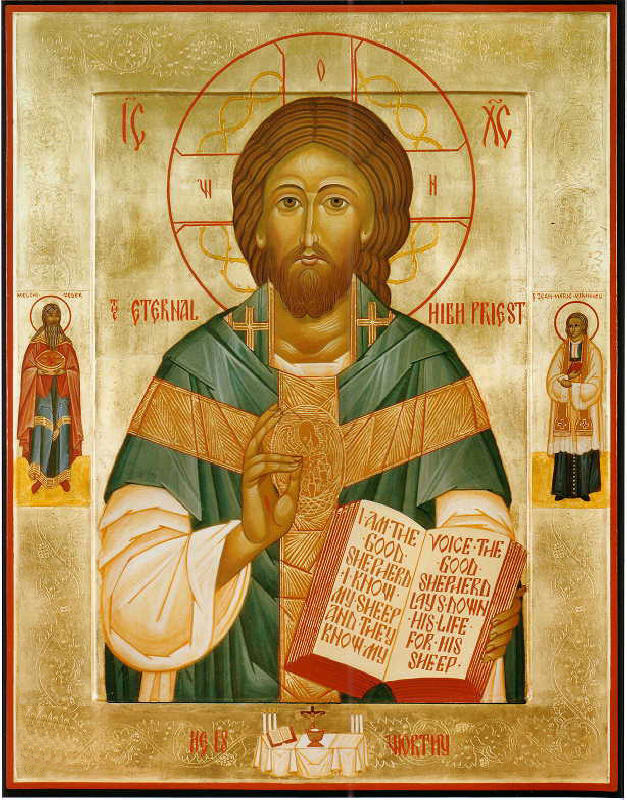|
This icon shows Jesus Christ, our Eternal High Priest.
Christ is blessing us while holding open a Gospel page which reads, "I am the Good Shepherd. I know my sheep and they know my voice. The Good Shepherd lays down His life for His sheep." To emphasize this statement, the gold pelican over His heart represents self-sacrifice. The border contains an altar and grapevines, representing the Mass. The secondary icons in the border are of Melchizedek, the ideal priest-king, and St. Jean-Baptiste Vianney, the patron saint of parish priests. |
who is Jesus Christ?
We believe that Jesus of Nazareth is God revealing Himself to us in the most humble and understandable way possible.
Who is Jesus Christ?
Jesus Christ is God the Son, who became man. He was born in the town of Bethlehem in the Holy Land, lived in and around the town of Nazareth, and died outside of Jerusalem.
Is Jesus Christ truly God?
Jesus Christ is truly God, the Second Person of the Trinity, called "the Son."
He is also called "the Eternal Word." (Genesis 1:26 and John 1:1) Jesus, with the Father and the Holy Spirit, always was, is, and always will be.
He is also called "the Eternal Word." (Genesis 1:26 and John 1:1) Jesus, with the Father and the Holy Spirit, always was, is, and always will be.
Is Jesus Christ truly Man?
Jesus Christ is truly man because He has the nature of man; Jesus has a body and soul. (CCC 471)
Was Jesus Christ always man?
What do we call the mystery of God becoming Man?
We call this mystery 'the Incarnation' which means that God the Son, became man, a human being like us in all things except sin.
How many natures are there in Jesus?
There are two natures in Jesus: the divine nature of God and the human nature of man. (CCC 464)
How many persons are there in Jesus?
There is only one person in Jesus, the person of God the Son.
Why did God the Son become Man?
God the Son became man to free us from sin and open to us the way to Heaven and everlasting life with God. (CCC 457)
Jesus claimed and revealed Himself to be God, and people at the time were offended by that. In the Gospel of John (10:30) after He says, “The Father and I are one," the crowd prepared to stone Him. When He asked them why, they replied, ““We are not stoning you for a good work but for blasphemy. You, a man, are making yourself God.” (10:33)
Jesus claimed and revealed Himself to be God, and people at the time were offended by that. In the Gospel of John (10:30) after He says, “The Father and I are one," the crowd prepared to stone Him. When He asked them why, they replied, ““We are not stoning you for a good work but for blasphemy. You, a man, are making yourself God.” (10:33)
What does the name 'Jesus' mean?
The name Jesus in Hebrew means, “God saves." God Himself gave this name to Jesus through His messenger, the Archangel Gabriel, to the most blessed Mary, His mother. (Luke 1:26)
Salvation comes through the forgiveness of sins, which can only be accomplished by God. The eternal Father sends His Son incarnate in human flesh to save His people from their sins. Through His Son’s perfect obedience, the prophecy of Isaiah is fulfilled: “My servant, the just one, shall justify many, their iniquity he shall bear.” (Isaiah 53:11) By HIs death and resurrection, the Lord accomplishes our redemption.
Salvation comes through the forgiveness of sins, which can only be accomplished by God. The eternal Father sends His Son incarnate in human flesh to save His people from their sins. Through His Son’s perfect obedience, the prophecy of Isaiah is fulfilled: “My servant, the just one, shall justify many, their iniquity he shall bear.” (Isaiah 53:11) By HIs death and resurrection, the Lord accomplishes our redemption.
What does the name 'Christ' mean?
The name Christ means 'Anointed'.
What do these names tell us ?
That Jesus was anointed by God the Father to be our Savior. (CCC, 430)
|
Robert Barron, Auxiliary Bishop of the Archdiocese of Los Angeles, explains who Jesus is and what makes Him different from figures like Buddha, Mohammad, and Deepak Chopra:
|
|
the Sacraments
We believe that Jesus instituted seven Sacraments during His life on Earth.
Read more about them by navigating the pages in the drop-down menu.
Read more about them by navigating the pages in the drop-down menu.
Papal Blessing: A Unique and Cherished Gift
|
Did you know...
You can obtain a certificate from the Vatican for an Apostolic Blessing for any of these sacraments: 1. Baptism, First Communion, Confirmation 2. Marriage 3. Wedding Anniversaries* (10, 25, 40, 50 , 60 years) 4. Priestly Ordination and Anniversaries 5. Religious Profession and Anniversaries 6. Secular Consecration 7. Ordinations of Permanent Deacons In addition to the sacraments, you can receive an Apostolic Blessing for these occasions: 1. Birthdays (18, 50, 60, 70, 80, 90, 100)* 2. for simply celebrating being a faithful Catholic individual* or family* The asterisk (*) indicates the need for the nihil obstat or approval of ecclesiastical authority. Sometimes the Bishop needs to approve the request, but oftentimes the Pastor can. Bring your completed request form (see below) to the Parish Office before mailing it out, and we will help you get the approval. The nihil obstat is a written declaration that the persons receiving the papal blessing are practicing Catholics. |
Send your request for a Papal Blessing to:
Elemosineria Apostolica - Office of Papal Charities Parchment Office 00120 Vatican City Because of the great volume of requests, and because papal blessings are prepared in different foreign languages, errors are not uncommon. Allow two to three months for your request to be processed. The blessing is a gift from the Vatican, but there are costs incurred which should be your gift back. The typical donation ranges from approximately €13-€25 for the parchment paper and calligraphy work plus approximately €10-€30 for shipping (i.e., approximately $15-$28 plus $11-$34). The donation should be made after you receive the Papal blessing and should be made via a bank transfer (the banking coordinates will be sent to you in the same parcel as the parchment) directly to the Vatican's Office of Papal Charities. For more information, see the Office of Papal Charities website. |
Requests must be made only by regular post or by fax. E-mail or phone requests are not accepted.
The written request should include:
- the first name, last name, and address of the person making the request;
- the first name and last name of the person(s) for whom the blessing is being requested;
- the reason or occasion prompting the request (see the list to the right);
-when the blessing is requested for the celebration of a sacrament, a religious profession, or an anniversary: the date, the name of the Church, and the address are required;
-the address of where to send the parchment
Use our form for convenience. The file is 3 pages long; use only the page that you need.
PRINT AND HANDWRITE: TYPE ONTO, RESIZE, AND PRINT:
The written request should include:
- the first name, last name, and address of the person making the request;
- the first name and last name of the person(s) for whom the blessing is being requested;
- the reason or occasion prompting the request (see the list to the right);
-when the blessing is requested for the celebration of a sacrament, a religious profession, or an anniversary: the date, the name of the Church, and the address are required;
-the address of where to send the parchment
Use our form for convenience. The file is 3 pages long; use only the page that you need.
PRINT AND HANDWRITE: TYPE ONTO, RESIZE, AND PRINT:
|
| ||||
Send your request for a Papal Blessing to:
Elemosineria Apostolica - Office of Papal Charities
Parchment Office
00120 Vatican City
Elemosineria Apostolica - Office of Papal Charities
Parchment Office
00120 Vatican City

